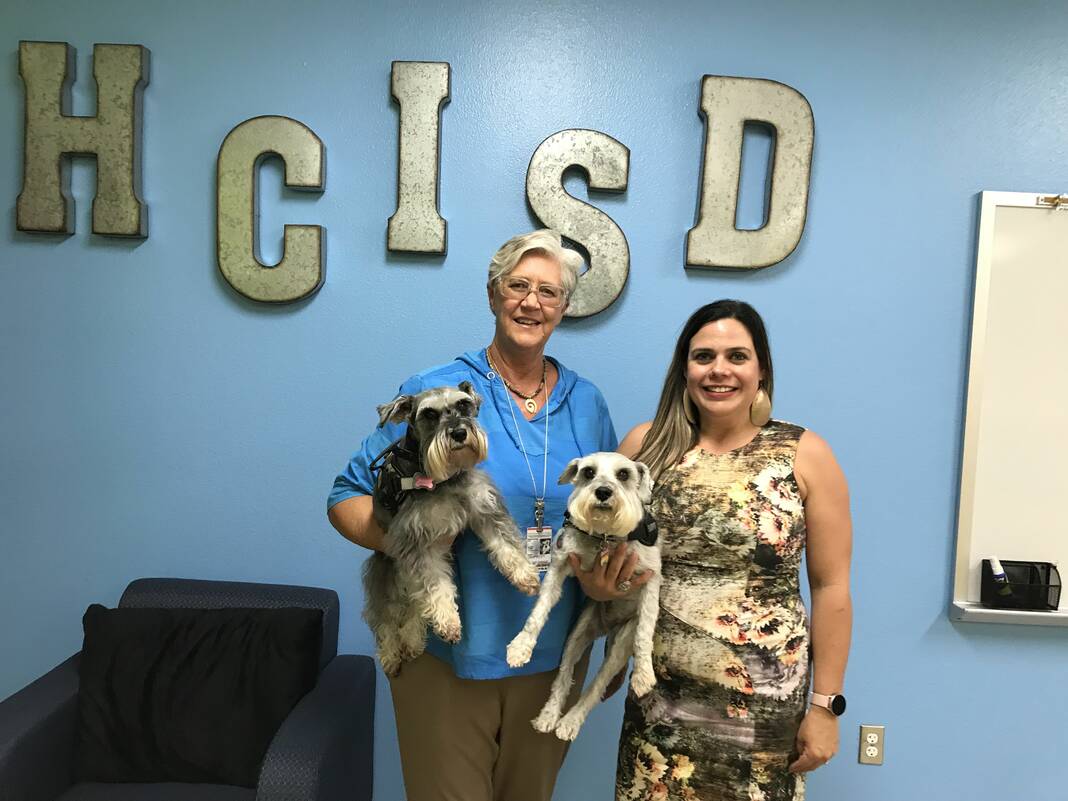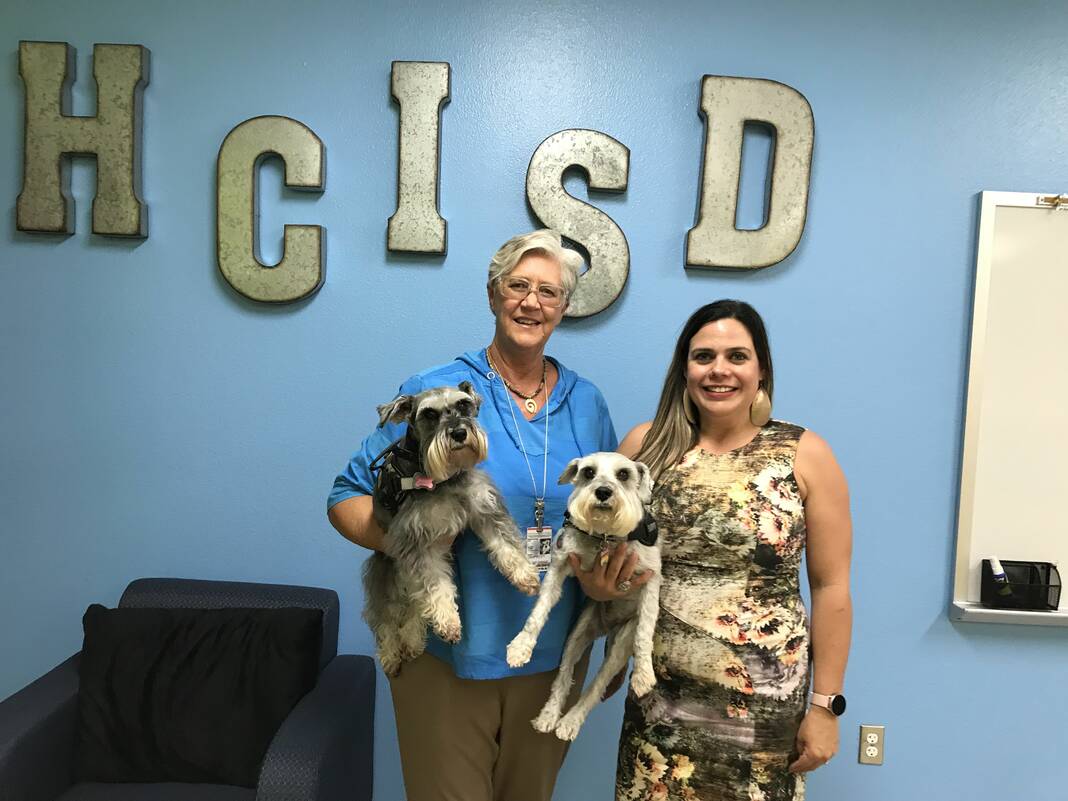

HARLINGEN — Piper looked up warmly, her vibrant brown eyes and shifting nose searching for love and any sign of distress.
Nearby, her brother Levi lounged in the lap of Cathy Steadman, one of two student wellness specialists hired by the Harlingen school district this year.
“The primary purpose of the position is that we are going to be providing support district wide,” said Steadman. “We are going to be providing crisis intervention counseling and wellness programs. Within that scope I will be utilizing the dogs at all of the schools in the district.”
It’s common knowledge that many animals have an intriguing ability to sense distress in humans. Surprisingly, there’s a scientific explanation.
“They are able to identify kids and adults who are suffering with mental health issues such as depression and anxiety,” Steadman said. “The main way they do that is through their olfactory senses because students and adults, when they are having issues with anxiety, will sweat a lot and the dogs smell that. And people who are depressed also emit certain smells that the dogs are very sensitive to, and they seek those people out and identify them.”
The Harlingen school district has just created these two positions in response to the multiple drastic changes that have upended students’ lives.
Steadman and the other specialist, Angela Totman, had already been working as school district counselors for quite some time, so it was only fitting that they should take on the new roles.
“A lot of students are experiencing depression and anxiety,” Totman said. “There was a 25 percent increase in depression and anxiety after COVID among the entire population according to the Centers for Disease Control.”
The students they will be working with are reeling from the Uvalde shooting and the heightened security measures in place at school. They’re recovering from the onslaught of COVID with the imposed isolation from their friends, the consequences of remote learning, the fear of the disease itself, and the loss of loved ones.
Yarely Aguilar, 16, lost her grandmother to COVID, and she worries about catching it herself.
“I’m kind of scared because if I get it then I’m probably going to get my family sick and I don’t want to get my family sick,” said Yarely, a sophomore at Harlingen High School.
She’s concerned about the increased security and the uneasiness of the current urban landscape.
“I feel kind of like scared because I’ve been bullied before in middle school,” she said. She paused for a moment and added, “Some guys told me things.”
Interestingly, COVID and the Uvalde shooting haven’t dampened her enthusiasm for the new school year.
“I say just go for it,” she said with a smile. “I have more and more friends. You’re going to make new friends.”
Nevertheless, Steadman and other school district officials have seen increased distress among students.
“I can address it from the point of summer counseling that I did,” Steadman said. “We had a lot of discussions about Uvalde and school safety in general. We had a lot of discussions around building resiliency and coping skills.”
She’s also seen the lasting effects of the lockdown and social isolation.
“We still see a lot of students that are not truly engaged,” Steadman said. “They’re there at school, they’re looking at their computer screens, but where the gap is, that they lost out on a lot of socialization skills from seventh grade coming in to ninth grade. That’s a very important time with your peers to learn those social skills and coping techniques. So that’s where I really hope to focus a lot of my energies as I am building those skills with students.”
Levi and Piper will provide Steadman and Totman quick access to children’s emotions. If a child is believed to be in distress, they will take student to a private area such as an office and introduce him to the dog. They will then begin asking questions about how he is feeling.
Certainly it’s not as simple as that.
Oftentimes children – and adults – will deny anything’s wrong. They may not even be aware themselves of their own suffering.
“I get that a lot,” Steadman conceded. “As a counselor there are certain ways that you can elicit that information from kids through questioning. Over the years you get a feel for the right things to ask and how to pull that information out of a student.”
And, of course, the dogs put the students at ease. The students put down their phones, they are fully present with the dog, they drop their defenses. And they talk.
Totman pointed out the importance of addressing the mental health needs of the entire community, as we have all suffered from these recent occurrences.
“We are all a community, and we can’t give what we don’t have so we also need to provide training opportunities and resources for staff and parents, the entire community,” Totman said. “That’s the only way we can help students with their mental health. That’s how we’re also going to save lives as far as the suicide prevention programs.”
One obstacle to addressing the mental health crisis is the stigma of mental health. Steadman and Totman want to educate students and adults to remove that stigma.
“We want to spread awareness about mental health concerns so that students are more likely to seek help,” Totman said. “There are going to be more help seeking behaviors when they see that the entire staff understands them and is talking to them about these issues.”
Students are also being brought in to participate in the intervention.
“We are implementing some new mental health initiatives and a suicide prevention program for all secondary campuses called the Hope Squad,” Totman said. “There’s going to be education on what to do when a student makes a statement that he wants to end his life. The students will be trained by advisors, there will be two advisors per campus which could be teachers or other staff members, and students will be trained on what to do.”
Recall that Steadman spoke of building resiliency.
The past two years seem to have already hard-wired many kids for survival – and even victory – in the face of a new age of tragedy and triumph.
“I feel like this year is different because we’re actually getting lockers and things that we didn’t get before due to COVID,” said Skyla Garza, 13, an eighth grader at Memorial Middle School.
“I’m excited because I feel that now that COVID’s not that big of a deal, there are going to be more opportunities at school,” Skyla said. “I feel like now there are more opportunities and I’ll get to experience more in middle school than before because of the COVID.”
And as for Uvalde?
“I don’t know,” she said. “It’s there in my mind, but I don’t really think about it much. I’m excited.”